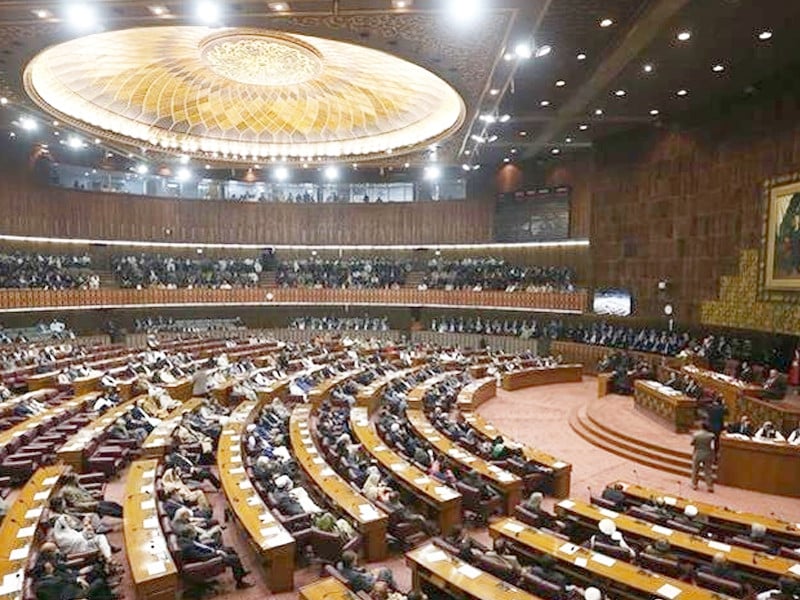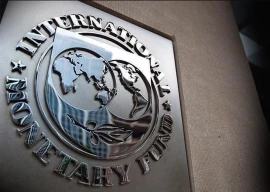
A day after tabling a much-hyped bill in the Senate about raising the strength of Supreme Court judges, the treasury benches moved to rehearse it in the National Assembly on Tuesday, but PTI chairman Barrister Goahr Khan foiled the government's bid by pointing out a constitutional requirement.
The PTI chairman argued that the bill could not be tabled by a private member without taking consent from the federal government under Article 74 of the Constitution.
Subsequently, NA Speaker Sardar Ayaz Sadiq deferred the bill for further deliberation before sailing it through NA despite argument of Minister for Law and Justice Azam Nazeer Tarar, who said that a similar bill was referred to the committee concerned by Senate a day ago.
Earlier, the bill could not be moved as the treasury benches had failed to complete quorum in the house. On Tuesday, Chaudhry's legislative move, which he himself described as a bill being tabled in line with "the doctrine of necessity", was barred. Thus, the fate of the bill stall hangs in the balance.
Under Article 81 (expenditure charged upon federal consolidated fund), the PTI chairman said that the bill could only be tabled by the government as it's putting a huge burden on the national exchequer rather than just adding a judge.
Responding to speculations that the government was behind the bill, the law minister said if the need arises, the government will openly table such a bill.
Comparing the situation with India, PTI's Gohar highlighted the Indian Supreme Court has 34 judges while the country's population was a whopping 1.45 billion. He also drew parallel between the judges' working days, saying the judiciary in Pakistan works 155 days in a year as compared to 190 days in India. Gohar argued in reply to Danyal, who had said that over 54,000 cases were pending in SC, citing an example of a convict whose appeal was taken up after 34 years.
Law Minister Azam Nazeer Tarar admitted that the judiciary in Pakistan remained in the shadow of colonial-era practices, clinging to long vacations originally intended for British judges to escape the subcontinent's searing heat. He added that the judiciary itself should delve into the matter in line with the backlog. Tarar revealed that the government was working on constitutional reforms package intending to bring improvement in the criminal justice system.
Constitutional Amendment Bills
Meanwhile, four bills pertaining to constitutional amendments were tabled in the National Assembly. The much-talked about three constitutional amendment bills included seeking reserved seats for the overseas Pakistanis, barring judges from holding dual nationality or citizenship and proposing constitution of a bench not less than nine members in suo motu matters. The bills were moved by JUI-F lawmaker Noor Alam Khan.
One of the bills sought amendment in Article 184 (3) (original jurisdiction of Supreme Court) of the Constitution. It stated the clause empowers SC to make an order involving question of public importance with reference to enforcement of fundamental rights. Currently, the orders involving matters of such public importance are made by SC benches consisting of two or three judges, the bill mentioned.
The bill proposed that such orders should be made by a larger bench of the SC consisting of not less than nine judges. Also, the proposed amendment provided for an appeal within 30 days of an order of SC under clause 3 of 184, to be heard by a bench larger than the bench which had passed the order under appeal.
Another bill sought amendments in Article 51 (National Assembly), 59 (The Senate), and 106 (constitution of provincial assemblies). It demanded allocation of two reserved seats each in the National Assembly and Senate and one seat each in the provincial assemblies for overseas Pakistanis.
The third constitutional amendment bill sought bar on holding dual nationality or citizenship by the judges of the high courts and Supreme Court. It stated that amendments be made in Article 177 (appointment of SC judges), 193 (appointment of high court judges)and 208 (officers and servants of courts) of the Constitution to ensure loyalty of the judges. It added that the judges should not hold foreign nationality or citizenship and any person holding the same shall not be entitled to be appointed as an officer or servant of any court.
The fourth bill seeking constitutional amendment in Article 198 (3) was tabled by PTI-backed member Changaze Ahmad Khan. The objective of the amendment is to improve the accessibility and efficiency of the judicial system for the residents of Faisalabad and its surrounding areas by establishing a bench of Lahore High Court in Faisalabad.
All the bills seeking constitutional amendments were referred to the committees concerned as the law minister did not oppose them. All the bills were allowed to be referred to the committees concerned. The Speaker and law minister repeatedly said that the tradition of opposing opposition's bills shouldn't be encouraged, adding the committees can decide their fate after threadbare discussion.
Other Bills
The day allocated for private members' bill in the National Assembly saw a heavy legislative agenda as apart from the constitutional-amendment laden bills. Other bills aimed at bringing major changes in judicial territory were tabled and referred to the committees concerned.
One of the bills tabled by Alam sought to repeal the Contempt of Court Ordinance 2003 while another bill by MNA Sohail Sultan demanded amendments in the Pakistan Penal Code of 1860 and Code of Criminal Procedure, 1898.
Two others, one by Alam and the other by PPPP MNA Agha Rafiullah, respectively, proposed amendments in the Civil Servant Act of 1973 and sought to reserve special seats for deserving persons in universities and high education through the Allocation of Special Seats for Deserving Persons in Universities Bill, 2024.
Debate on corporate farming
Meanwhile, the session started with a call attention notice submitted by PPPP lawmakers, inviting attention of the minister for water resources to a matter of urgent public importance. The minister's attention was drawn towards the news report revealing 4.8 million acres of land is being given for corporate farming resulting in diversion of water and causing grave concern amongst the public.
The PPPP lawmakers – Syed Naveed Qamar, Syed Khursheed Shah, Mir Ghulam Ali Talpur, Syed Hussain Tariq and Nawab Yousaf Talpur – termed the matter sensitive and raised concerns on water's availability and its distribution among the provinces. Khursheed Shah questioned the move, asking if anyone has calculated how much water will be required to cultivate 4.8 million acres of land. He urged that a decision needed to be made, "if we need 48 lakh acres of land or Pakistan" as the issue could lead to terrorism and revival of the "Sindhu Desh" slogan.
Minister for Water Resources Musadik Malik responded by saying the Green Pakistan Initiative is being adopted to improve crop yield through advanced technology, reduced labor time and efficient management of fertilizers and irrigation processes. He said that any reservations could be addressed by sitting together and discussing the issue. Malik said that he was confident that nothing would lead to terrorism or anti-state slogans as long as PPP was in power in Sindh.
Mengal Resigns
Sardar Akhtar Mengal, a senior politician and leader of the Balochistan National Party-Mengal (BNP-M) announced his resignation from the National Assembly citing frustration over the lack of interest in Balochistan's issues as the reason. Mengal made the announcement right at the Parliament's main gate soon after quorum was pointed out as he rose up to speak on the situation in Balochistan.
During the session, the NA Speaker reiterated that the issue will be discussed during the day following the call attention notice and legislative business. However, when an MNA of MWM Hameed Hussain was asked to cut short his speech, he tore up some papers, threw them in the air and pointed out quorum. When the quorum was found incomplete after the count, the session was adjourned till Wednesday morning.















1725352489-0/Untitled-design-(35)1725352489-0-270x192.webp)








COMMENTS
Comments are moderated and generally will be posted if they are on-topic and not abusive.
For more information, please see our Comments FAQ